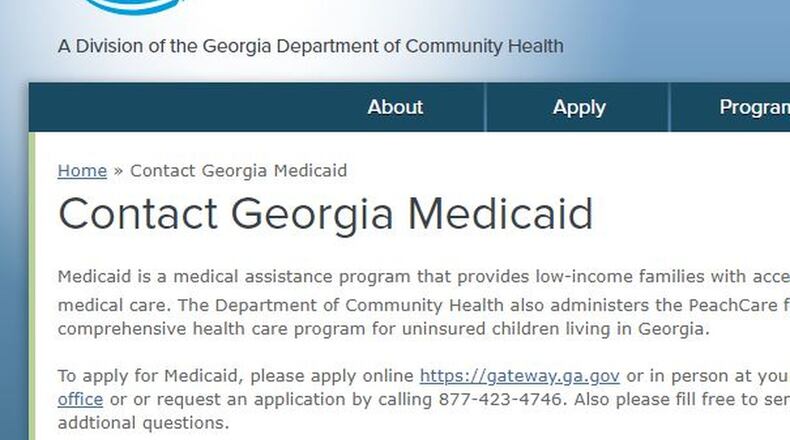The agency that provides health care to about 2 million Georgians is requesting an increase of almost $500 million in its state budget over the next year and a half.
Enrollment growth in Medicaid — the state-federal health care plan for the poor and disabled — and rising usage and costs will continue to put a bigger dent in government coffers, officials said Thursday,
Meanwhile, Lisa Walker, chief financial officer of the Department of Community Health, said the health care plan for more than 650,000 teachers, state employees, retirees and their dependents could see two-thirds of its reserve drained by 2024 as expenses outpace revenue from premiums and government subsidies.
Both have become common scenarios for the government programs that fund health care for about a quarter of the state’s population: Heath care costs continue to rise in Medicaid, and that means a larger infusion of taxpayer money into the system. The State Health Benefit Plan for teachers and state employees is regularly projected to run a shortfall in coming years.
Gov. Brian Kemp last month told state agency directors not to request spending increases in the coming year, but he made exceptions for programs that expected to see a rise in usage and expenditures. As in past years, a vast majority of that increase will be in k-12 schools, colleges and the Department of Community Health, which runs the Medicaid and State Health Benefit Plan programs.
Enrollment in some health plans run by the DCH spiked during the initial months of the COVID-19 pandemic as Georgians lost jobs both during and after the economic shutdown.
At the same time, many of those in the program delayed care due to the fear of infection or other reasons. DCH officials expected Medicaid recipients to return to the doctor for treatment this year as COVID-19 vaccinations became more available.
The federal government pays for the majority of the DCH’s $17 billion budget, although the state also chips in several billion dollars. The DCH’s budget, when including federal funding, is the largest part of the state government’s spending.
The DCH has to ask for a big increase in funding pretty much every year as health costs rise. Walker said the department is requesting $122 million more in the midyear budget — which runs through June 30 — and $359 million more in fiscal 2023, which begins July 1.
The agency’s request now goes to Kemp, who will decide what to include in the budget proposal he will deliver to the General Assembly in January.
Besides presenting the DCH budget proposal, Walker on Thursday gave the agency’s board a briefing on the financial status of the State Health Benefit Plan.
Money for the program comes from employee/retiree premiums and the government.
The Community Health board earlier this month froze premiums for members for the third time in four years.
Walker said expenses outpaced revenue by $89 million last fiscal year and would do so by about $337 million this year.
The program currently has about $3 billion in reserve, but that could fall to $1 billion by the end of fiscal 2024 as losses escalate. The trend could be reversed by higher premiums, increased government subsidies, reduced expenditures or changes in the heath coverage.
The teachers, state employees and retirees on the program keep a close eye on its finances because lawmakers raided the reserve during the Great Recession to help the state balance its books. That led to higher premiums and attempts to change benefits to build back the reserve.
DCH officials have projected massive shortfalls in the past, so teacher groups have expressed skepticism about the estimates.
About the Author
Keep Reading
The Latest
Featured


